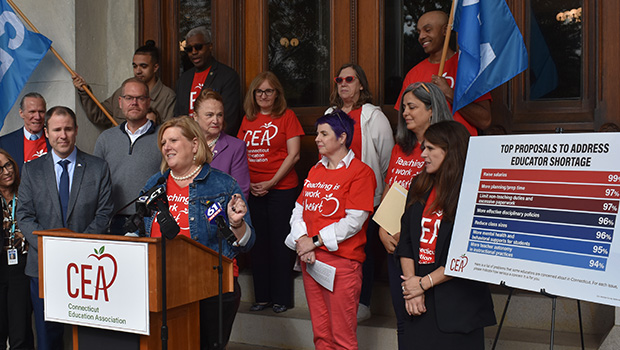Nearly two months into the school year, many Connecticut classrooms are without certified teachers, and a CEA survey released this afternoon gets to the root of the problem: a continued failure to address systemic issues in the state’s public schools.
The survey of more than 7,600 Connecticut educators found that myriad challenges facing educators—exacerbated by inadequate pay, poor working conditions, stress, and lack of autonomy and respect—translate to record numbers of educators eyeing the exits and fewer people entering the teaching profession. Survey respondents identified several solutions to the teacher shortage, making the profession more attractive by raising salaries, providing more prep and planning time, limiting non-teaching duties, and more.
“We cannot continue to ignore the data,” CEA President Kate Dias told reporters at a news conference this afternoon, where survey results were made public. “If you look at our data, it’s telling the story of educators who are stressed out and not feeling tremendously supported.” (View data graphics.)
Among the most alarming findings in this year’s survey are that 77% of teachers are feeling more frustration and burnout than in the past, in many cases the highest level of burnout ever—and nearly three-quarters (74%) say they are more likely to retire or leave the profession early.
“These numbers were shocking in last year’s survey,” said Dias, “and it’s disheartening that while we sounded the alarm, we haven’t moved the needle. If you stood here a year ago with me, we talked about these very same issues. We warned that something must be done to address our underpaid, undervalued, and underresourced teachers.”
Among the many serious issues Connecticut educators identified as problematic in the most recent survey:
- Stress and burnout (98% of educators surveyed)
- School and classroom decisions made by politicians and non-educators (97%)
- Staff shortages (95%)
- Teachers leaving the profession (94%)
- Lack of respect for educators (94%)
- Student mental health (93%)
 State Representative Jeff Currey, chair of the Education Committee, spoke of his committee’s work on several of these issues in the last legislative session, as well as the need to get more legislators on board.
State Representative Jeff Currey, chair of the Education Committee, spoke of his committee’s work on several of these issues in the last legislative session, as well as the need to get more legislators on board.
“What we continue to be shocked by is the lack of action and understanding by folks in power who have the ability to make change,” he said, telling educators, “You have been trained, you are professionals, and you have invested in yourselves to ensure our students are getting a high-quality learning experience every single day. We have to respect our educators and trust them to tell us what is best for them—and what is not best for them.”
 Echoing Currey’s remarks, Education Committee ranking member Representative Kathleen McCarty added, “There is nothing more important we can do right now than elevate the teaching profession and advocate for our teachers, who faced the pandemic with courage. If you look at the behavioral supports needed in classrooms and the many academic and other demands placed on educators, we need to be cognizant of all those challenges and the fact that teachers are leaving the profession.”
Echoing Currey’s remarks, Education Committee ranking member Representative Kathleen McCarty added, “There is nothing more important we can do right now than elevate the teaching profession and advocate for our teachers, who faced the pandemic with courage. If you look at the behavioral supports needed in classrooms and the many academic and other demands placed on educators, we need to be cognizant of all those challenges and the fact that teachers are leaving the profession.”
To address factors underlying the teacher shortage, CEA members recommended
- More competitive salaries (cited by 99% of teachers surveyed)
- More planning and prep time (97%)
- Limits on non-teaching duties and excessive paperwork (97%)
- More effective school policies to address student behavior (96%)
- Smaller class sizes (96%)
- Appropriate mental health and behavioral supports for students (95%)
- More teacher autonomy in instructional practices (94%)
CEA’s survey also found that teachers are disillusioned to the point that 64% say they would not encourage a friend or family member to enter the profession.
“This is so telling,” said CEA Vice President Joslyn DeLancey. “So many educators went into the field because of a teacher who made an impact on them, but if teachers can no longer promote the profession to new generations, the pipeline will continue to diminish as people select careers with less stress, more autonomy, and better pay.”
 CREC civics teacher and State Representative Kevin Brown, sworn into office less than a year ago, noted that he joined the legislature in order to continue sounding the alarm among lawmakers about the teacher shortage, the reasons behind it, and what needs to be done to solve it.
CREC civics teacher and State Representative Kevin Brown, sworn into office less than a year ago, noted that he joined the legislature in order to continue sounding the alarm among lawmakers about the teacher shortage, the reasons behind it, and what needs to be done to solve it.
“At the end of the day, our schools are nothing if we cannot do right by our students,” said Brown, “and our students need their teachers. In order to keep teachers in the classroom, we need to invest in them and listen to them.” Emphasizing the grim results of CEA’s newest survey, he said, “Look at these numbers, and treat them as the emergency they are.”
“We know that supporting teachers with good, inclusive policies will pay off in many ways, and it will pay off big,” said Representative Robin Comey. “CEA really listens to their members and learns about their needs so that they can represent them, and we—as legislators—benefit from that, because it shows us how we can provide better support for our teachers.”
DeLancey commended legislators such as Currey, McCarty, Brown, and Comey for their work in previous legislative sessions, which included an overhaul of Connecticut’s teacher evaluation system, the reintroduction of play into the early grades, additional funding for school districts, and more. She emphasized that many actions can be taken ahead of and outside the legislative session to generate positive change for teachers—including rallying communities to allocate the necessary funding for better teacher salaries and well-resourced classrooms and provide the right supports within schools.
“We can ensure that superintendents are hired who are compassionate, empathetic, and smart, who have creative solutions, and who are not afraid to be reflective and listen to the people who are in the classrooms,” DeLancey said.
 “Every stakeholder can help,” said Granby teacher KC Petruzzi, “because there is no one solution to this problem. Districts need to adjust salaries to reflect the needs of their staff. Parents need to work with educators to help set expectations for the school environment. Members of the community need to understand we are trained professionals with the best interests of our children in mind and heart; challenging curriculum, books, and classroom decisions for political hit points is demoralizing and counterproductive. Administrators need to support staff with resources, training and time to accomplish the work we need to do.”
“Every stakeholder can help,” said Granby teacher KC Petruzzi, “because there is no one solution to this problem. Districts need to adjust salaries to reflect the needs of their staff. Parents need to work with educators to help set expectations for the school environment. Members of the community need to understand we are trained professionals with the best interests of our children in mind and heart; challenging curriculum, books, and classroom decisions for political hit points is demoralizing and counterproductive. Administrators need to support staff with resources, training and time to accomplish the work we need to do.”
She stressed that lawmakers and need to pass legislation that financially incentivizes people to enter the profession as well as enact policy that “respects teachers as professionals and cuts red tape and meaningless reporting that doesn’t help us help our kids. Making people love teaching again means giving us what we need to be successful both financially and professionally. If we put all our solutions together, we can start to make progress.”
 Newington educator and 2023 Connecticut Teacher of the Year finalist Jennifer Rodriguez shared that in the last school year, 25 educators left her district by November alone, for reasons that included unsafe classroom environments, outsize demands on teachers, and pay that is not commensurate with the work.
Newington educator and 2023 Connecticut Teacher of the Year finalist Jennifer Rodriguez shared that in the last school year, 25 educators left her district by November alone, for reasons that included unsafe classroom environments, outsize demands on teachers, and pay that is not commensurate with the work.
“I have a master’s degree and am halfway through my second master’s program,” Rodriguez said, “and nearly a decade after completing my first master’s, I am not yet at the average starting salary as other professions with the same degree. This has everything to do with local education budgets being slashed year after year. Legislators have to step in and raise the minimum pay rate for educators. This is a national crisis. The shortage is real. End the shortage for Connecticut. Pay us what our education and experience dictates. Pay us what we are worth.”







